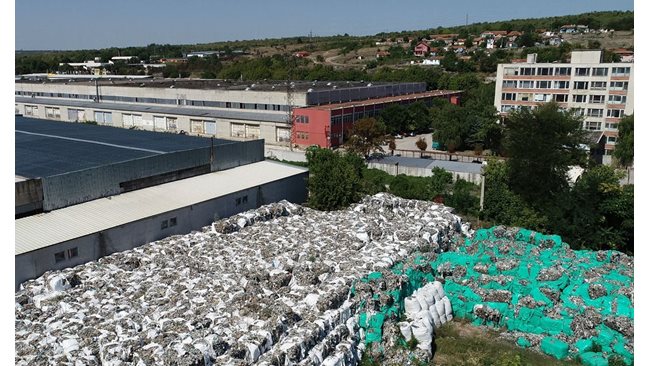
[ad_1]
16,756 tonnes of waste, including 7,756 tonnes of hazardous waste, were found during inspections of the Special Prosecutor’s Office against Atanas Bobokov, Plamen Bobokov, former Deputy Minister of the Environment Krassimir Zhivkov, managers of the company and director of the RIEW. The waste was found on settlement lands in four districts, according to the state attorney’s office.
In the land of the city of Cherven Bryag, district Pleven, in a silage pit, and in the village of Ruptsi, district Pleven, in a septic tank, a total of 396 tons of hazardous waste were buried in the land of the city from Lom, Montana district: 501 tons of hazardous waste and in the city of Pleven: 9000 tons of non-hazardous waste and approximately 5000 tons of hazardous waste; in the Shumen land – 751 tons of hazardous waste and in the Kremikovtsi land, Sofia – 1108 tons of hazardous waste.
According to the legislation in force in the Republic of Bulgaria, each company that generates hazardous waste is obliged to export it within a year or deliver it for temporary storage to another Bulgarian company that has a permit for its subsequent processing and recovery of waste. However, to import hazardous waste into the Republic of Bulgaria, the company must have a notification issued and obtain the consent of the Ministry of Environment and Water of the Republic of Bulgaria, in accordance with Regulation №1013 / 2006 / EC /. From the evidence gathered so far, it is established that the defendant Krassimir Zhivkov has begun to refuse to issue such notifications and the companies that generate hazardous waste have been forced to deliver it for storage to certain companies that have permission to store said waste in the territory. On the side.
Monbat Recycling EAD, controlled by Atanas Bobokov and Plamen Bobokov, also benefited from the scheme. The company had built a recycling factory in Montana, where the sulfuric acid batteries are processed. As a result of this recovery, the hazardous waste in question is produced, the so-called polyethylene separator, which remains after the treatment of the batteries and is not subject to further use and must be stored under special conditions.
From the evidence gathered so far, it has been established that one of the defendants has registered shell companies for the storage of hazardous waste, some of which were financed by Atanas Bobokov and Plamen Bobokov.
During the investigation, it was established that on January 25, 2018, a contract was entered into between Monbat Recycling EAD and one of the fictitious companies for the recovery of waste with the code 19 12 11 * (polyethylene separators obtained from the recovery of depreciated sulfur acid batteries). In compliance with this contract, in 2018 Monbat Recycling EAD delivered 635.28 tons of hazardous waste to the company. Monbat Recycling EAD delivered the same amount to another company and to a third company: 1,465.11 tons of hazardous waste.
Companies of the Monbat Group, controlled by Atanas Bobokov and Plamen Bobokov, registered in Romania, Italy and Serbia, imported large amounts of hazardous waste into the country, which were delivered for storage to fictitiously registered companies that did not have the capacity and capacity. for storage and recycling of waste, incl. and dangerous.
So far, 11 people have been processed in the pre-trial proceedings. They will be liable for the fact that in the period from January 2014 to May 28, 2020 on the territory of the Republic of Bulgaria: Sofia district, Pleven district, Plovdiv district, Ruse district, Montana district, Shumen district, Vratsa district participated in organized criminal group within the meaning of Article 93, Article 20 of the Penal Code to commit crimes provided for in Article 255, paragraph 1 of the Penal Code, Article 353b, paragraph 1 of the Penal Code Article 353c , paragraph 1 of the Penal Code, article 282, paragraph 1 of the Penal Code.
With the help of Eurojust, a joint investigation team has been set up between the Special Prosecutor’s Office and the Prosecutor’s Office of Salerno, Milan and Florence in Italy. Furthermore, the competent prosecutor’s office of the Republic of Romania prepared a European Investigation Order, which was adopted by the Directorate for Investigation of Organized Crime and Terrorism.
[ad_2]